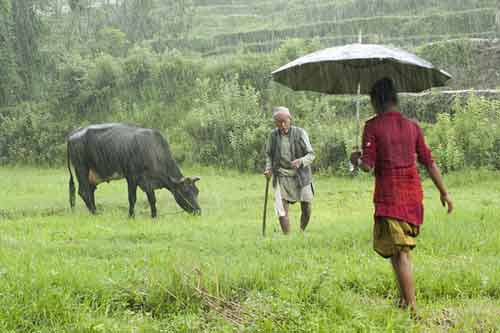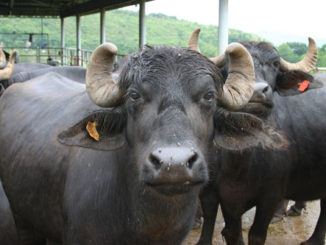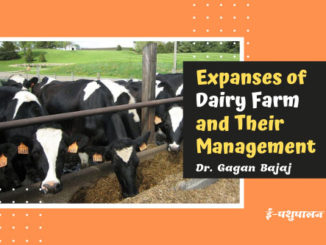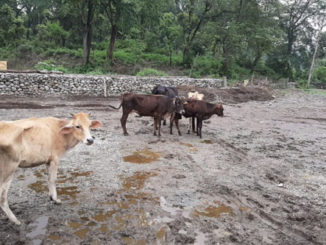Lightning and thunderstorms are disastrous weather events.Their effects on human life have been extensively accounted but are widely ignored when it comes to animals. Every year, incidents of lightning and thunder strikes are common in our country. They are more prevalent in Eastern and Central part of the country. States like Orissa, Uttar Pradesh, Bihar, Maharashtra, Jharkhand are at high risk of these incidences. Livestock population is rich in these states and animals are mostly reared in large open farms under extensive system. These are at a high risk of fatalities and associated damage. Recently lightning strikes in Uttarakhand and Bihar show changing trends related to their geographical occurrence and degree of damage. Need of the hour today is to understand the issue seriously and act vigilantly.

Not only wild animals but livestock animals like horse, donkeys, sheep, goat, pig which are easily reared in open pastures or grasslands and tend to gather under trees during storms and are at an even higher risk of getting struck by lightning.
The dangerous effects of lightning strike include burns, damage to fur, flesh, bone, bloat, cardiac arrest, nervous damage etc. This can cause huge economic losses to animal husbandry and dairy industry as well as small farmers rearing goats, sheep, pig or mules being reared by farmers in hilly terrain for transport purposes. Horses which are reared in large open ranches are also at risk.
How to diagnose fatalities due to lightning
Usually animals die without showing any signs.However some of the common visible signs and post mortem findings can be used to find out the cause of death in livestock due to lightning strike are:
- Large herds of animals dying in groups.
- Petechial haemorrhages in internal body organs.
- Presence of unchewed food in mouth.
- Burn marks or singe marks on medial aspect of legs.
- Damage to wool and body coat.
Some of the management strategies to avoid damage to farm and livestock that can be followed by farmers are:
Before lightning strikes
- Analysing history of any lightning strike incidents in the area and preparing accordingly.
- Proper grounding of animal sheds, barns and other units.
- Creating enclosures for animals so that they do not collect under trees.
- Creating double rows of trees instead of single row around a farm as lightning tends to strike at a single tree rather than group of trees.
- Installation of fire extinguishers and smoke screens as lightning may cause fire at some places.
- Insurance of the farm and livestock beforehand.
- Avoid using metal water tanks or other metal equipment and sheds on rooftops.
After lightning strikes
- Evacuate the injured animals and provide them first aid.
- Contact a vet as soon as possible in case an animal is seriously injured.
- In case of mass mortality proper burial methods should be adopted.
- Animals specially horses should be monitored regularly during recovery period and check for any foot injury or fungal infections.
- Large uprooted trees should be checked if any of the animal is stuck underneath.
Recovery
- Animals should be provided with fresh and clean water and food.
- Should be given proper rest to recover from the stress.
- Supplements and vitamins should also be given for speedy recovery.
- Check lesions near the hock and fetlock after the lightning strikes especially in case of horses.
- Pregnant, young and older animals should be monitored at regular intervals.
- Remove animals from waterlogged areas to avoid hoof related problems.
- In case of burns the wound should be bandaged properly and checked at regular interval.
Role of government and other organisations
Educating the farmers about the dangerous effects of lightning can be a start. Early warning and mitigation strategies can help protect the animals from severe injury and economic losses to livestock owners. Keeping a track of weather forecasts by means of radio can also be a solution. Veterinarians and extension officers should educate the farmers about harmful effects of lightning strike and also about benefits if making their farms lightning-proof. Distribution of medicines and veterinary facilities should be ensured by the concerned disaster management authorities. NGOs working for animals can deploy volunteers in affected regions. Government help can be in the form of providing compensation to farmers based on the damage occurred and information about policies and schemes regarding insurance of the farms and redressal mechanisms against natural disasters.
The issue can be controlled timely if taken into consideration and requires joint efforts of all individuals for better livestock health and productivity.
|
The content of the articles are accurate and true to the best of the author’s knowledge. It is not meant to substitute for diagnosis, prognosis, treatment, prescription, or formal and individualized advice from a veterinary medical professional. Animals exhibiting signs and symptoms of distress should be seen by a veterinarian immediately. |






Informative article, keep it up
Relevant issue regarding recent events.Keep it up!
Very Nice topic and very well presented. Good job Dakshi
Very informative article,a most important livestock health issue which is generally neglected is well emphasized. Keep it up…wish u all the best…
Very informative.. So well written very proud of you.. Can’t wait to read moreeeee!
Very informative..👏👏
Beautifully written and quite informative
Great Post Dakshi!
Very relevant and important issue.Keep it up!
This article tells us about the need of the hour. A very alarming issue is presented here and explains everything pretty easily even for a layman not belonging to the veterinarian community. Well done! Keep it up!
It is aptly written and quite informative. Good job Dakshi👍
Such a amazing piece of writing!!
Well done for this work…
We’ll be looking forward for more related articles.
The part of content written in the context of wild animals getting affected by such calamities is very apt and needs concern. Very well written and described. Kudos!
To think about living beings is a moral responsibility of every human on earth.When it comes for the saving of lives of Pet animals, domestic animals,cattles and even homeless animals it shows the deapth of sensitiveness of the thinker.I appreciate Ms Dakshi Joshi for her furtile brain and innovative thought with all her emotions capsulated by scientific approach.When thoughts come with such ornaments the result comes in the form of present write up(Essay)Thanks,greetings and all the very best to Dakshi for future.
Beautifully written with every important aspect keeping in mind
Well presented and very apt.
Relevant and important issue.Keep it up!
Very informative